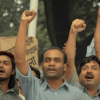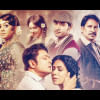1971: Shei Shob Din: Hridi Huq’s herculean effort brings Liberation War to life

There has been a stereotype established amongst the audience that the directors, who emerge into the world of cinema from television medium, fail to bring a cinematic essence in their works.
To my understanding, one of the major reasons behind that is— they fail to understand that the way of representing a story on the silver screen has significant additional elements that need to be paid attention to. These are— framing, art direction, costume, makeup and sound design—which create an individualistic language in cinema.
The reason that I bring this up is, after watching "1971 Shei Shob Din" (initially released on August 18, countrywide), I had to give Hridi Huq her due props for nailing all the essential elements of cinema, that too on her first try.
A lot of times, producers and directors tend to neglect their own product while making government-granted films, and tend to just get done with it without accounting for the actual quality, which was far from the case in "1971 Shei Shob Din".
Hridi Huq's cast selection, and each crewmember deserves salute. For instance, we have always known Litu Anam as an actor. Although he acted in this film, he is also the art director of the project, which many were unaware of.

Personally, I became nostalgic due to the ambience and costume design of the film, since I have personally witnessed the post-Liberation time of Bangladesh while growing up. I could feel the essence of the time through the visual depiction of the film's environment, the way the female characters draped saree, and much more. The entire film was shot in Thakurgaon, and I have to appreciate their choice of the location.
Kamruzzaman Ronnie, the chief assistant director, also played the role of one of the cinematographers. Not only that, he also lent his voice to the beautiful song "Jachchho Kothay" in the film, and his efforts were herculean.

Coming back to the captain of the ship, the way she managed and controlled the entire team is commendable. Her research on the script was top notch and this reflects on the screen very well. Although the story has originally been written by her father, Enamul Haque, Hridi has completely scripted the film from the ground up.
Even though all of the cast did their job well, a special mention for Ferdous is absolutely necessary, as I feel like it was his most believable work since "Hothath Brishty".
I felt this is the right approach to present the Liberation War to the new generation, who have grown up listening the stories of the horrific event.

Of course, there will be research and documentaries on the event, but to reach a wider range of masses, films are noteworthy, to say the least. We really need more formidable efforts like this, if we are to retell the stories of our great Liberation War.
Rafi Hossain is a journalist and former Editor of Star Showbiz, The Daily Star.

 For all latest news, follow The Daily Star's Google News channel.
For all latest news, follow The Daily Star's Google News channel. 









Comments